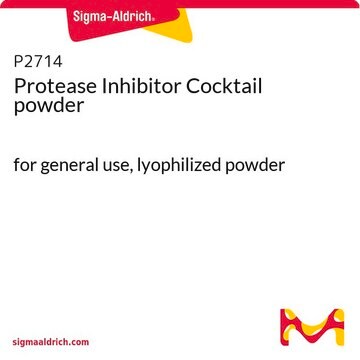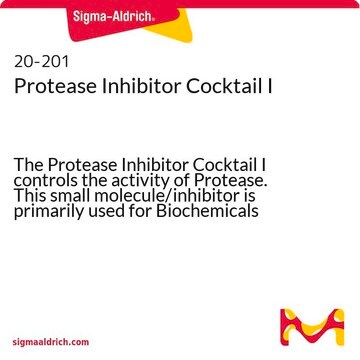P8465
Protease Inhibitor Cocktail
lyophilized powder, for the inhibition of serine, cysteine, aspartic, metalloproteases and aminopeptidases, for use with bacterial cell extracts, lyophilized powder
Sinónimos:
Protease inhibitor
About This Item
Productos recomendados
Nombre del producto
Protease Inhibitor Cocktail powder, for use with bacterial cell extracts, lyophilized powder
Quality Level
form
lyophilized powder
storage temp.
−20°C
¿Está buscando productos similares? Visita Guía de comparación de productos
General description
The product contains individual components that target serine, cysteine, aspartic, and metalloproteases, as well as aminopeptidases.
Application
Biochem/physiol Actions
Features and Benefits
Contains individual components, including AEBSF, EDTA, Bestatin, Pepstatin A, and E-64, each targeting specific types of proteases.
Lyophilized powder is stable for at least 2 years when stored unopened at -20°C.
Supplied with a vial of DMSO for preparation of a cocktail solution.
One mL of the cocktail solution is recommended for the inhibition of protease activity found in 20 mL of cell lysate from 4g of E. coli cells.
Caution
Preparation Note
related product
signalword
Danger
hcodes
Hazard Classifications
Acute Tox. 4 Inhalation - Eye Dam. 1 - Met. Corr. 1 - Skin Corr. 1A - STOT RE 2 Inhalation
target_organs
Respiratory Tract
Storage Class
8A - Combustible corrosive hazardous materials
wgk_germany
WGK 3
ppe
Eyeshields, Faceshields, Gloves, type P3 (EN 143) respirator cartridges
Elija entre una de las versiones más recientes:
Certificados de análisis (COA)
¿No ve la versión correcta?
Si necesita una versión concreta, puede buscar un certificado específico por el número de lote.
¿Ya tiene este producto?
Encuentre la documentación para los productos que ha comprado recientemente en la Biblioteca de documentos.
Los clientes también vieron
Contenido relacionado
Select different protease inhibitor types based on your needs to prevent protein degradation during isolation and characterization and safeguard proteins in sample prep.
Select different protease inhibitor types based on your needs to prevent protein degradation during isolation and characterization and safeguard proteins in sample prep.
Select different protease inhibitor types based on your needs to prevent protein degradation during isolation and characterization and safeguard proteins in sample prep.
Select different protease inhibitor types based on your needs to prevent protein degradation during isolation and characterization and safeguard proteins in sample prep.
Nuestro equipo de científicos tiene experiencia en todas las áreas de investigación: Ciencias de la vida, Ciencia de los materiales, Síntesis química, Cromatografía, Analítica y muchas otras.
Póngase en contacto con el Servicio técnico


















